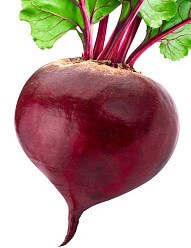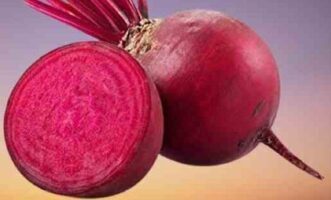Beetroot
What is beetroot?
Beetroot is the root of a beet plant commonly known as beets in North America. The vegetable is

called beetroot in British English and is also known as the table beet, garden beet, red beet, dinner beet or golden beet.
Other varieties of the same species include sugar beet, a leafy vegetable known as chard or spinach beet, and mangelwurzel which is fodder. Three subspecies are generally recognized.
Primarily for their greens, and cultivated by the ancient Egyptians, Greeks and
Romans. In Roman times, it is believed that they were also cultivated for their roots.
Since the Middle Ages, beets has been used as a treatment for various conditions, especially digestive and blood-related ailments.
Usually, the deep purple roots of beetroot are boiled, fried or raw and mixed with any salad vegetable.
The green, leafy part of beetroot is also edible. Young leaves can be added raw to salads.
When mature leaves are usually served boiled or steamed. Beetroot can be roasted, boiled or steamed, peeled and then eaten hot with butter.
Can be cooked, pickled, and then eaten cold as a condiment. Can be peeled, sliced raw and eaten as a salad.
Pickled beetroot is served as a traditional dish in many countries.
Beetroot scientific name
Species: Beta vulgaris
Subspecies: Beta vulgaris subsp. vulgaris
Cultivar group: Conditiva Group
Origin: Sea beet (Beta vulgaris subsp. Maritima)
Beetroot nutrition
Serving Size: 85g
Calories: 51
Water: 88%
Total Fat: 0.1g
Sodium: 281mg
Total Carbs: 10g
Dietary Fiber: 2g
Total Sugars: 10g
Protein: 1g
Beetroot benefits
- Beetroot lowers blood pressure
Nitric oxide present in beetroot helps relax blood vessels, reducing high blood pressure conditions.
For people with high blood pressure, adding 200-250 ml glass of beetroot juice daily or adding 80-100 grams of beets to salad can help reduce high blood pressure or blood flow disorders and maintain healthy levels.
A study examining the effects of drinking beetroot juice on 68 people with high blood pressure found that it significantly lowered blood pressure after consumption.
Hypertension is a primary risk factor for cardiovascular disease (CVD). Reducing it through dietary changes and other means can help prevent heart failure, stroke, heart attack, and other life-threatening complications of CVD.
- Beetroot prevents anemia
Many may believe that the red color of beetroot only helps to prevent anemia.
However, a study has shown that beetroot juice is rich in iron and folic acid which help in the formation of red blood cells that carry oxygen and nutrients to different parts of the body to ensure a healthy blood count.
It is a fact that regular consumption of beetroot juice alone cures menstrual disorders and anemia in women.
- Beetroot increases physical strength
With all the nutrients, The beets definitely packs a punch in your workout. When you consume beets juice or raw, you can run faster and longer with less effort.
The sugar in it gives you an instant energy boost while supplementing with extra nitrates and iron. A study showed that those who drank beet juice had faster muscle recovery.
So, it is safe to say that nitrates from beetroot juice reduce muscle fatigue.
- Beetroot contains super antioxidants
The antioxidant properties of foods help protect cells from damage and increase blood levels of antioxidants that help protect our bodies from harmful free radicals.
If the levels of free radicals increase inside the body, they can cause oxidative stress that damages your DNA and cell structure.
The Beets contains up to 1.7 mmol of antioxidants per 3.5 ounce (100 g) serving. There is evidence that it reduces the risk of colon and digestive tract cancer.
- Beetroot helps with constipation
One cup of beets provides 3.81 grams of fiber. Adequate fiber intake is essential for smooth digestion and gut health.
The Beets contains a lot of fiber. It is extremely beneficial in regulating your digestive processes and facilitating bowel movements for quick relief from constipation.
Betalines present in beets is an agent that helps maintain good overall digestive health. Constipation can be quickly relieved by drinking beet juice or eating boiled beets.
- Beetroot has healthy brain function
Beets also contains significant amounts of boron, which is associated with the production of human sex hormones and helps increase brain function and concentration.
In fact, beets is effective in maintaining healthy brain function and preventing symptoms of cognitive impairment. Nitric oxide and boron found in beets are effective in speeding up blood flow and increasing cognitive function as we age.
- Help reduce diabetes levels
Because beets contains antioxidants, it can help lower glucose levels and increase insulin sensitivity.
A 2019 review of studies by Trusted Source looked at the effects of alpha-lipoic acid on diabetic neuropathy symptoms.
Researchers found that oral and intravenous administration of alpha-lipoic acid supplements reduced symptoms of peripheral and autonomic neuropathy in people with diabetes.
- Beetroot benefits for men
Beets are said to be one of the best foods to help men get an erection.
It works like Viagra by increasing nitric oxide levels. Nitric oxide dilates blood vessels and increases blood flow to the penis.
Beets are naturally rich in nitrates. The stomach converts them into nitric oxide (NO), which dilates blood vessels and improves circulation.
Nitric oxide (NO) acts as a vasodilator to open blood vessels and help maintain pressure in the corpora cavernosa of the penis to support a hard erection.
9. Beetroot benefits for women
Beets is a good source of iron, which is beneficial for women during menstruation. It is rich in beta-carotene and antioxidants, which promote blood flow to the uterus.
Moreover, it helps to balance hormones and reduce excess estrogen levels. Beets are a great source of folic acid and potassium which is a great helper during your period.
Nutrient-dense beetroot helps improve blood circulation to your scalp. Also, its high potassium levels counteract potassium deficiency which can lead to sodium build-up that inhibits new hair growth. Drink beetroot juice daily and see how it strengthens the follicles making your hair super healthy.
Beetroot juice purifies the blood, thus helping to eliminate toxins which in return makes the skin glow. Vitamin C in beetroot helps in anti aging and wrinkles.
Consuming beetroot juice helps regulate your bowel movements and prevent fat accumulation in your body. It is an excellent detoxifier and lowers your cholesterol. Magnesium found in beets helps in the healthy functioning of muscles and nerves. High magnesium intake can increase testosterone levels, which helps build muscle and burn fat.
References:
